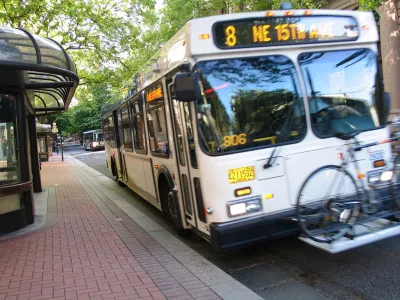Fines will be waived for low-income riders, among other changes aimed at bringing "fairness and equity" to TriMet's enforcement system.

The Board of Directors of TriMet has restructured the way the agency penalizes fare evasion.
Currently, riding without fare is punishable by a $175 fine. Beginning in July, fines for adult riders will be assessed in tiers corresponding to the number of prior offenses, with $175 as the highest. Community service will also become an option in lieu of payment, with required hours determined by a similar tier structure.
Additionally, fare citations will be waived for adult riders eligible for TriMet's low-income fare program (launching concurrently with the new penalty system), or the existing Honored Citizen program for senior and disabled riders.
"The changes are in response to criticism that fare evasion charges disproportionately affect minorities and unnecessarily pushes too many of them into the criminal justice system," Jim Redden of Portland Tribune reports. Similar concerns have prompted changes to fare enforcement strategies in New York, Cleveland, Washington state, and California. In Portland, an internal study found "no systemic racial bias" in TriMet's fare enforcement, but noted that pushing people into the court system over the low-level offense could "affect a person's ability to get a job, rent a house or serve in the military."
FULL STORY: TriMet changes fare evasion penalties

National Parks Layoffs Will Cause Communities to Lose Billions
Thousands of essential park workers were laid off this week, just before the busy spring break season.

Retro-silient?: America’s First “Eco-burb,” The Woodlands Turns 50
A master-planned community north of Houston offers lessons on green infrastructure and resilient design, but falls short of its founder’s lofty affordability and walkability goals.

Delivering for America Plan Will Downgrade Mail Service in at Least 49.5 Percent of Zip Codes
Republican and Democrat lawmakers criticize the plan for its disproportionate negative impact on rural communities.

Test News Post 1
This is a summary

Test News Headline 46
Test for the image on the front page.

Balancing Bombs and Butterflies: How the National Guard Protects a Rare Species
The National Guard at Fort Indiantown Gap uses GIS technology and land management strategies to balance military training with conservation efforts, ensuring the survival of the rare eastern regal fritillary butterfly.
Urban Design for Planners 1: Software Tools
This six-course series explores essential urban design concepts using open source software and equips planners with the tools they need to participate fully in the urban design process.
Planning for Universal Design
Learn the tools for implementing Universal Design in planning regulations.
EMC Planning Group, Inc.
Planetizen
Planetizen
Mpact (formerly Rail~Volution)
Great Falls Development Authority, Inc.
HUDs Office of Policy Development and Research
NYU Wagner Graduate School of Public Service




























